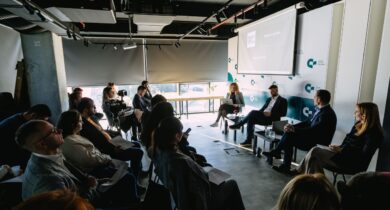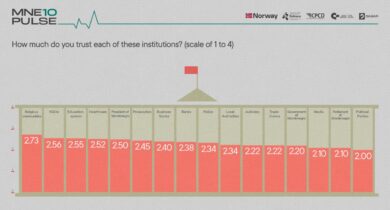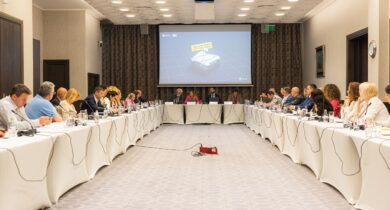There has been a significant decline in optimism among citizens regarding the direction in which Montenegro is heading, along with an increase in those who are finding it increasingly difficult to cover the monthly cost of living. Over the past two months, the dominant sentiment has been concern, with a high level of support for… »
Research
Citizens’ perceptions of the media: interests of the powerful above public interest
“Political orientation of the media significantly shapes their reporting style, and media often deliver verdicts before courts do. Few people believe in full media independence. Additionally, there is a widespread belief that RTCG is susceptible to political influence, yet it also demonstrates a certain level of professionalism in its work,” are some of the findings… »
Corruption in Montenegro: A System Rooted in Distrust and Selective Justice
Corruption is deeply embedded in various segments of Montenegrin society, significantly undermining citizens’ trust in institutions. The majority of citizens identify systemic problems in the judiciary, healthcare, security, education, and local governance sectors. Although most claim they have not directly witnessed corruption, the high perception of its presence in key sectors serves as a warning… »
Youth in Montenegro Facing Uncertainties Within Traditional Frameworks
“Youth in Montenegro face numerous challenges, including limited employment opportunities, job market insecurity, and a lack of professional development prospects. At the same time, their role in society is often underrecognized, with findings indicating that, in the current context, they are increasingly turning to religion. It is crucial to develop strategies and policies based on… »
Numerous threats to the development of multiculturalism in Montenegro
The prevailing perception, although lower than before, that Montenegro is a multicultural society remains, yet there are numerous and concerning indicators pointing to a high level of perceived discrimination – 49.1% based on religious and 59.7% based on national affiliation. Simultaneously, over half of citizens would not want a partner of a different religion or… »
Knowledge of the facts and attitudes of youth about the 1990s in Yugoslavia
“The 1990s are primarily marked by negative events and corresponding negative emotions in the collective memory of young people in Montenegro, although there is also a layer of cultural and personal memories that make the perception of this period complex. The dominant belief is that this period is significant for our society, but this is… »
Citizens disapprove Spajić’s attitude towards Parliament, and a systemic institutional crisis is evident
The economic situation remains a significant challenge, with 48.5% of Montenegrins stating their monthly income is insufficient to cover expenses. This is compounded by a crisis of legitimacy in state institutions, excluding the Special State Prosecutor (SSP), as trust declines among those with the power to improve citizens’ lives but who continue to prioritize party… »
Peer violence is a major problem in society, urgent measures needed to address it
Peer violence is widely perceived both among high school students and the general population. Every fifth student reports being a victim of violence, and 53.4% know someone who has been a victim of peer violence. The most common forms of peer violence in schools are psychological and physical violence. Among students who have been victims,… »
What kind of state of Montenegro do we need?
At the level of a political formula – a set of desirable values and the accompanying institutional framework that ensures them, and through which the system legitimizes itself, there is a majority consensus among the citizens of Montenegro regarding Montenegro as a European state of rule of law, democracy, social justice and inclusion, and environmentally… »
Citizens agree on the recognition of the problems, but they do not see solutions soon
In Montenegro, the critical attitude towards various actors and processes is increasingly pronounced, which can be seen through the generally rather low level of trust in institutions, caution in defining the situation, rationality in sorting out priority issues, but also a deeper view concerning the difference between the rule of law and political tactics, as… »










